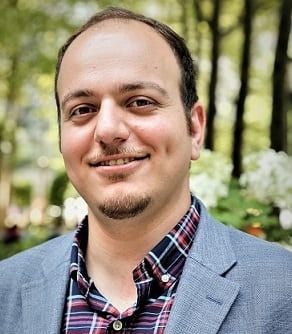Title: Intelligent Human-Robot Fusion: The Horizon of Assistive Robotics @ MERIIT Lab
 Prof. S. Farokh Atashzar,
Prof. S. Farokh Atashzar,
Assistant Professor,
Electrical & Computer Engineering
Mechanical & Aerospace Engineering
New York University
Talk Brochure: Human-Robot Fusion @ MERIIT Lab
Abstract: — Society aging has raised significant concerns regarding the balance between available resources and the needs of citizens for urban life of tomorrow. Robotic systems have been seen as a technological bridge that can deliver a wide range of medical services to patients relaxing the burden on the healthcare system and democratizing the accessibility to the needed services under the umbrella of telemedicine. The need has been pronounced during the COVID-19 pandemic when almost all healthcare capacities were booked for fighting against the virus. Interactive robotic technologies have already revolutionized the field of neurorehabilitation and have been successful in accelerating neural recovery and motor restoration for patients living with neural damages (such as those caused by stroke, which is the leading cause of motor disabilities) through promoting brain plasticity. In addition to the above, neurorobotics (such as exoskeletons and prosthetic systems), interfaced with the human neural system, have been successfully utilized in the past decade to augment the motor capabilities of individuals living with the lack of mobility or a biological limb. Although such systems have shown a great potential for delivering rehabilitation and assistance, there still exist several challenges and needs to make the technology (a) more accessible in remote areas to facilitate equal opportunity for a wider range of patients, regardless of geographical and demographic barriers under the telemedicine umbrella, (b) more intelligent in delivering assistance, (c) more adaptable to the biomechanical signatures of the users, (d) and more robust in decoding neural responses. This has led to active research in the fields of neurorobotics, AI, and biosignal processing. Motivated by the notes above, this talk aims to report on recent developments from the MERIIT lab at NYU, covering multiple topics related to human-robot integration in the context of (tele)robotic rehabilitation and smart bionics.